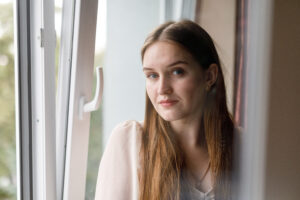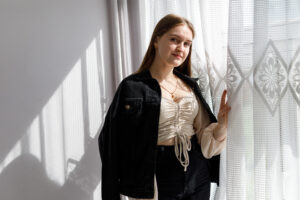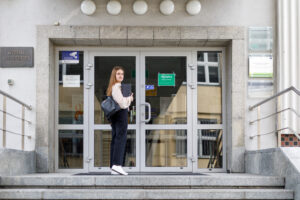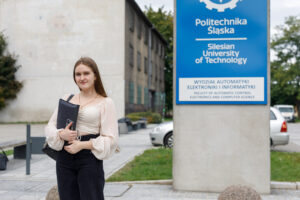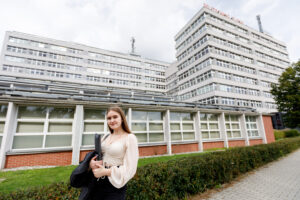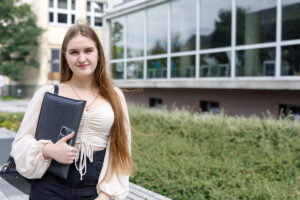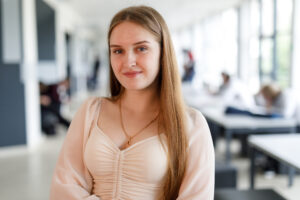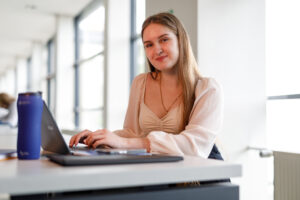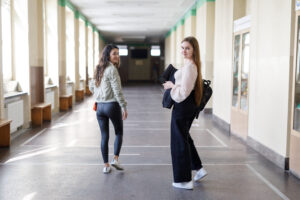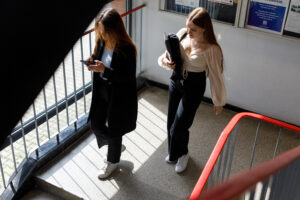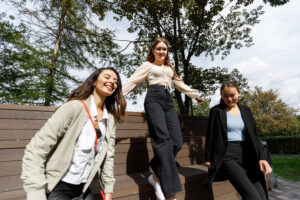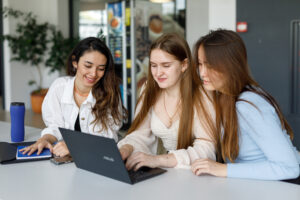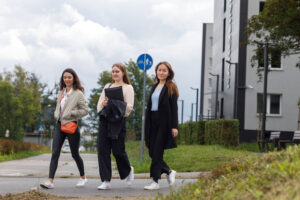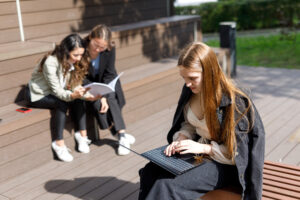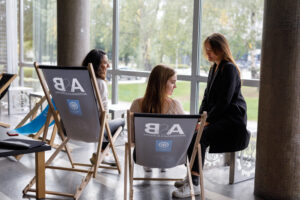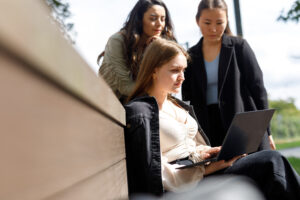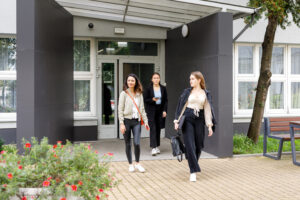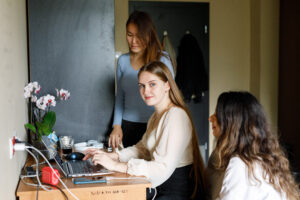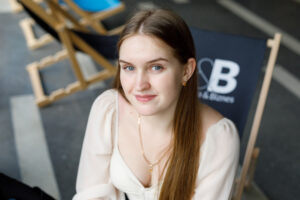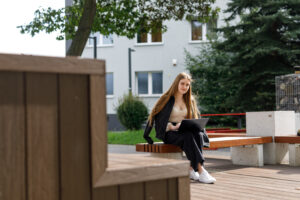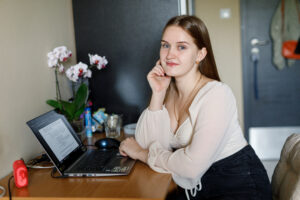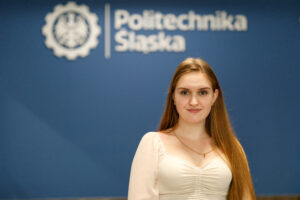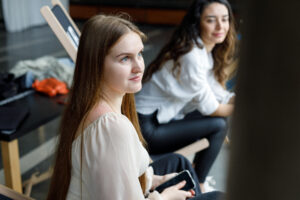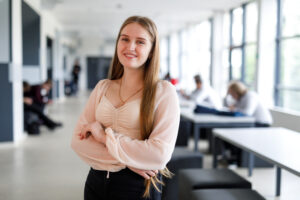
Despite the war: how a student from Sumy realised her dream of studying abroad
Over the past eight years, 10,000 Ukrainian students have gained invaluable international experience during their studies and internships at European universities thanks to the European Union’s Erasmus+ programme. When the war broke out in February 2022, many students found themselves unable to return home. One of them was Sofia Pinchuk, who learned of Russia’s full-scale invasion of Ukraine at the airport while waiting for her flight home.
Thanks to Erasmus+, Sofia got the opportunity to stay in Europe and safely continue her studies.
Flight home was scheduled for 24 February
On the night of 24 February, Sofia went to the airport to take a flight home from Poland. However, checkin-in for the flight was repeatedly delayed and eventually cancelled. At that time, no one understood what was going on. Alarming reports were coming out from Ukraine, yet the Ukrainians waiting for their plane still wanted to go home.
Some women began to cry because they wanted to return to their children who were in real danger. Sofia was thinking of buying a bus ticket to get home. No one realised the scale of events that were unfolding in Ukraine. The student recalls that her only wish was to go home to see her parents who were waiting for their daughter at the airport in Kyiv. At the same time, they began to dissuade her from returning and urged her to stay in Poland.
“We were informed about the closure of all airports in Ukraine. By that point, all the passengers were monitoring the latest news. I began to panic because I was stuck in a foreign country,” recalls Sofia.
She changed the date of her flight and returned to the dormitory after being persuaded to do so by her parents and Ukrainian friends. Since it was early morning, there was only a cleaning woman on duty in the dormitory. Overcome by emotion and stress, Sofia couldn’t explain why she had suddenly decided to come back, but the woman gave her the key, and the university’s academic mobility office allowed Sofia to stay in the dormitory. The university also immediately offered to continue her course of study for another semester.
“When the war began, all the other Erasmus+ students texted me, they asked how everything is going with my relatives. I received messages every day. Polish students also supported me. The volunteer department of the university offered assistance,” says Sofia.
Dream of studying abroad
Sofia has been proactive since school – she received top grades, was class monitor, and was selected as captain of the women’s football and basketball teams. Her whole life is a constant movement.
Back then, she dreamed of studying abroad, but her limited English prevented her from making this dream come true. Sofia has a passion for dance and maths. She qualified for a government-funded scholarship at Sumy State University, majoring in applied mathematics. At the same time, she continued to practice dancing.
She chose to go to Sumy university because it was one of the best in Ukraine and played an active part in Erasmus+. But Sofia soon realised that she wouldn’t go far without learning English. She tried several English courses before finding the most effective one and began intensive language studies. However, she shied away from studying abroad. The university’s dance club was holding her back. And then coronavirus came along, the university switched to distance learning and the dance lessons were cancelled.
“When it comes to studying, I never wanted to limit myself to attending classes. But then they were cancelled due to quarantine restrictions. Sitting at home and attending online lectures in my pyjamas doesn’t appeal to me. In the end, I decided to pursue my dream,” says Sofia.
One day, Sofia saw an announcement about Erasmus+ on the Instagram page of Sumy University’s academic mobility department. Students were being offered an opportunity to spend an academic semester at the Silesian University of Technology in the Polish city of Gliwice.
Sofia immediately applied and was selected. At first, her parents were uneasy about the idea of studying abroad, especially since she had never left home for a long time. However, they refrained from voicing their fears because they wanted to show support for their daughter. And so, at the beginning of her third year of study, Sofia went to Poland.
Lots of practice, new friends and first travel experience: opportunities provided by Erasmus+
At first, Sofia found it difficult to adjust to her new life, but the university offered a friendly environment. She adapted quickly and made new friends.
The education systems in Poland and Ukraine are very similar. However, Sofia finds that foreign universities place greater focus on practical training. Students abroad make extensive use of electronic sources and hardly ever take any notes.
Shortly after the start of the academic year, the university introduced a mixed form of education due to a new wave of coronavirus infections. Students were given the opportunity to decide whether to attend the university or join online classes. Once Sofia went to an offline lecture and discovered that she was the only student in attendance. The professor was pleasantly surprised to see her, because he came all the way from another city where a branch of the Silesian University of Technology is located.
“At first, the professor suggested waiting for the other students. After the lecture, he said he would continue giving lectures even if I was the only one attending them,” said Sofia.
Later, the university switched completely to distance learning. However, Sofia simultaneously attended online classes at Sumy University, so she was busy all the time.
During her stay in Poland, Sofia lived off the EU scholarship under the Erasmus+ programme. She received enough money to pay for her lodging, food, and even trips abroad. In one semester, Sofia, in company with a group of Kazakh students, managed to visit Norway, the Czech Republic, France, and Spain. She had only travelled abroad once before. Some of the other Erasmus+ students took flights to Kyiv and Lviv.
“Our friends went to Ukraine while we were on the flight to France. They were impressed by what they saw in Kyiv and said they’d love to go back,” Sofia says.
How Erasmus+ helps Ukrainians since the beginning of the war
The European Commission immediately introduced flexible procedures for educational and academic exchanges following the full-scale Russian invasion of Ukraine. Svitlana Shytikova, who is the coordinator of National Erasmus+ office in Ukraine, said that students were given the opportunity to submit applications for grants directly to European universities, thus bypassing Ukrainian education institutions as they were unable to hold competitions in a safe manner. In other words, if any Ukrainian university has difficulty in organising competitions, then those students who want to join Erasmus+ can find the information about this programme on the website of any European university and apply to take part.
Moreover, international cooperation projects got the opportunity to adapt their activities to the needs and challenges arising from the war. Ukraine was granted special permission to conduct an additional call for project proposals under the programme’s Jean Monnet Actions. Within the framework of these Actions, EU funds are allocated to universities for the purpose of spreading knowledge in the field of EU integration, creating centres of excellence, and expanding scientific activities in the field of education.
This year, Ukrainian universities were advised to submit a large number of projects under Jean Monnet Actions, resulting in a record 43 higher education institutions in Ukraine winning financing for 93 projects, compared to 121 projects funded over the past 7 years. In other words, financial support for Ukraine has increased more than fourfold since the beginning of the war.
At the same time, the European Commission has stopped all projects in Russia and Belarus, and reallocated parts of their budgets to Ukraine.
The university where Sofia was studying did all it could to help Ukrainians. In particular, the university dormitory underwent repairs and was used to accommodate refugees. Full-time students from Ukraine were released from the obligation to pay for education and accommodation for the duration of the war. Sofia also lived in this dormitory for free.
Safe and secure, but mentally with loved ones in Ukraine
Sofia’s thoughts were always with her loved ones. Her parents and her 10-year-old brother stayed with relatives in Kyiv until April because it was too dangerous to return home.
Sofia admitted that she, like many other Ukrainians, felt guilty about being safe. But thanks to her parents and friends, she overcame this feeling. They convinced her that being able to stay safe, continue her studies, make plans for her future and help rebuild Ukraine after the victory is what matters most right now. Eventually, Sofia calmed down and devoted herself fully to her studies.
Foreign education helps you define top priorities in life
Sofia is grateful for the opportunity to be safe and focus on personal development. She studied all summer long. First, she took exams at Polish and Ukrainian universities, completed a thesis, and prepared for admission to a master’s degree programme in Ukraine.
“I took a little time off. Went to the gym, engaged in self-learning. I didn’t go to work, because education and personal growth are my top priorities right now,” explains Sofia.
Thanks to her overseas study experience, Sofia realised that she wanted to choose another specialty. So now she has applied for a master’s degree in computer science.
“I find it more interesting, more modern, and there is more practical training. I applied for Erasmus+ once again, and I am still waiting for the results,” says Sofia.
How to apply for Erasmus+
If you also want to spend an academic semester at a European university and gain international experience that will be useful for your future career, then you need to submit an application through your university. The information on cooperation with European higher education institutions within the framework of Erasmus+ can be found on the website of your university. Alternatively, you can apply for participation in the competition directly through a European education institution, in which case the Erasmus Dashboard will come in handy.
General information about foreign education under the Erasmus+ programme is available here. By clicking on the link, you will find information about the duration of the training, terms and conditions, financial support, etc. You can also find out how the programme helps Ukrainian students during the war. All available mobility projects can be found here.
Check out the latest news about various types of mobility on Facebook page of the National Erasmus+ Office in Ukraine.
If you have any questions, please contact the Erasmus+ office team in Ukraine. Contact details:
- [email protected]
- +380993322645 (Viber, WhatsApp, Telegram).
What is Erasmus+
Erasmus+ is the European Union’s programme of international cooperation with other countries, which aims to support the educational, professional, and personal development of citizens within and beyond EU borders to contribute to sustainable growth, improvement of employment quality, development of innovations, strengthening European identity and active citizenship.
The programme expands opportunities for higher education and academic mobility of employees of educational institutions, students, and youth, supports projects and partnerships for capacity building and the development of international cooperation with different countries of the world.
Author: Sofiia Minjosa
MOST READ
SEE ALSO

‘The Kremlin has entered the chat’: how to protect your personal data on Telegram and avoid the bait of propaganda

No, time is not on Russia‘s side
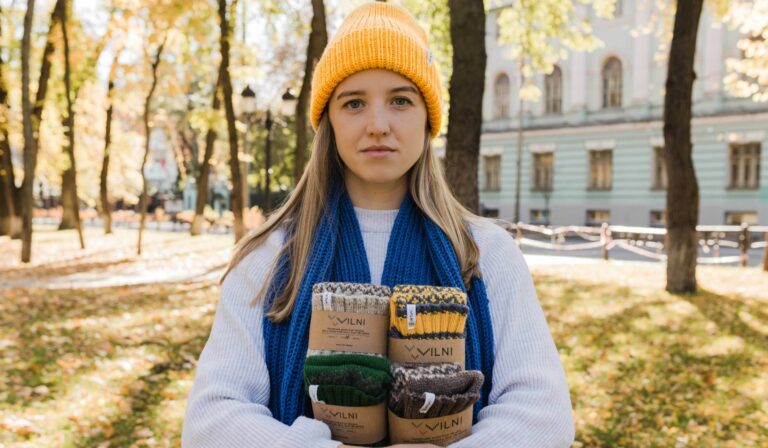
Socks for Peace: how the Vilni project is supporting internally displaced women in Ukraine
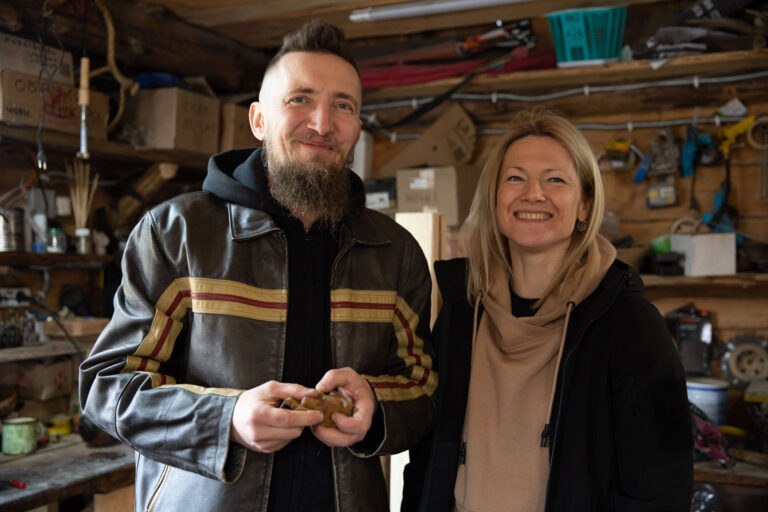
Celebrating traditional Ukrainian cultural identity in Rivne
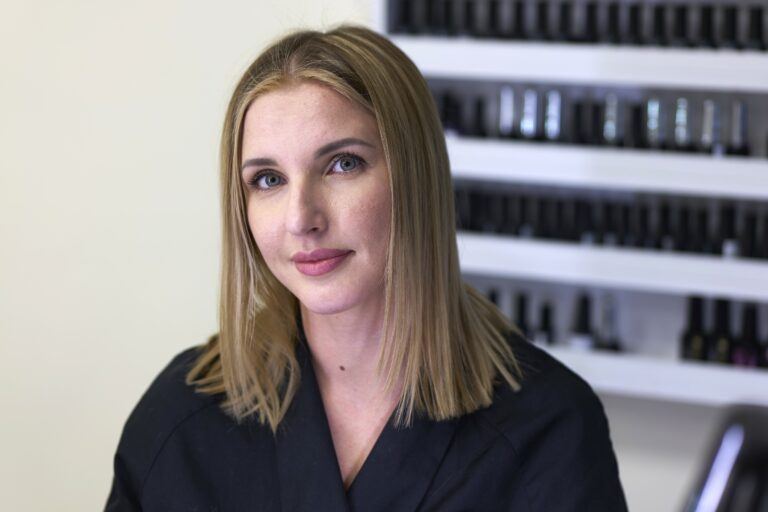
Natalia wanted her child to escape the war: how a single mother set up a successful business in Lithuania
More campaign pages:
Interested in the latest news and opportunities?
This website is managed by the EU-funded Regional Communication Programme for the Eastern Neighbourhood ('EU NEIGHBOURS east’), which complements and supports the communication of the Delegations of the European Union in the Eastern partner countries, and works under the guidance of the European Commission’s Directorate-General for Neighbourhood Policy and Enlargement Negotiations, and the European External Action Service. EU NEIGHBOURS east is implemented by a GOPA PACE-led consortium. It is part of the larger Neighbourhood Communication Programme (2020-2024) for the EU's Eastern and Southern Neighbourhood, which also includes 'EU NEIGHBOURS south’ project that runs the EU Neighbours portal.

The information on this site is subject to a Disclaimer and Protection of personal data. © European Union,
